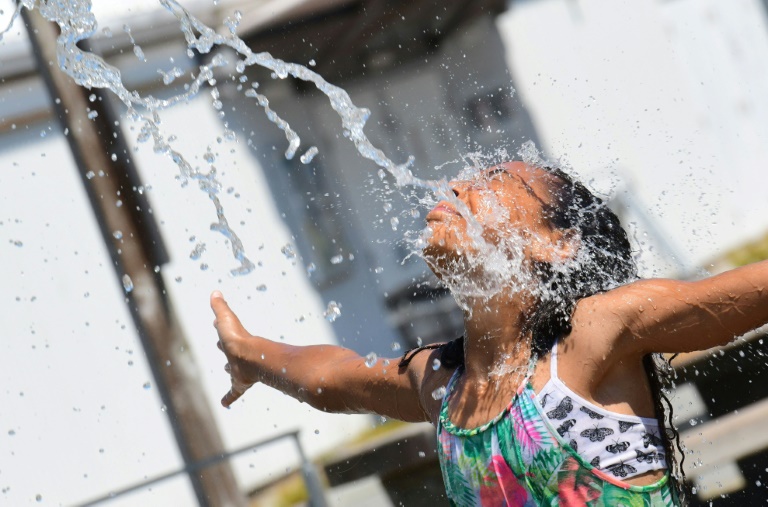Millions of people in western Canada and the northwestern United States were under heat alerts Wednesday as the region baked in record-breaking temperatures and police reported scores of deaths likely linked to the scorching conditions.
The heat wave has stretched emergency services, with at least 134 people dying suddenly since Friday in the Vancouver area and hundreds more across British Columbia, according to Canadian police and the local coroner.
“The temperatures recorded this week are unprecedented –- lives have been lost and the risk of wildfires is at a dangerously high level,” said Canadian Prime Minister Justin Trudeau.
The northwestern US state of Washington recorded at least 16 deaths related to the heat wave, including two who died of hyperthermia as their bodies overheated, county health officials said.
Soaring temperatures in California’s valley, mountain and desert areas raised fears of wildfires amid windy dry conditions, with lightning storms that could spark blazes forecast across several parts of the western United States.
President Joe Biden told a virtual meeting with governors from western states that “the threat of western wildfires this year is as severe as it’s ever been.”
Recalling last year’s record wildfires that burned more than 10 million acres (four million hectares) across the United States and caused “orange skies that looked like end of days,” Biden warned that this year “could be even tougher.”
Federal officials say the fire season is already outpacing last year’s — the worst on record in drought-hit California.
Around 9,000 firefighters have already been deployed to battle blazes across a dozen US states, in particular northern California’s Lava Fire, which has scorched more than 17,000 acres.
– ‘Whole town is on fire’ –
All 250 residents were forced to evacuate the town of Lytton about 155 miles (250 kilometers) east of Vancouver after wildfires began spreading rapidly on Wednesday.
“The whole town is on fire. It took, like, a whole 15 minutes from the first sign of smoke to, all of a sudden, there being fire everywhere,” Lytton mayor Jan Polderman told Canadian broadcaster CBC News.
Footage showed fires raging on the hills overlooking Lytton and engulfing the town as locals rushed to safety under clouds of smoke.
Residents of another 241 homes in the area were issued evacuation orders by regional authorities.
The town set a Canadian high-temperature record for the third day in a row Tuesday, reaching 121 degrees Fahrenheit (49.5 degrees Celsius), the country’s weather service, Environment Canada, reported.
The Vancouver Police Department said Wednesday it alone had responded to more than 98 sudden deaths since Friday, with the vast majority “related to the heat.”
The Pacific coast city for several days recorded temperatures around 90 degrees Fahrenheit — almost 20 degrees above seasonal norms.
“It’s never this bad. I’ve never seen anything like this,” said a Vancouver resident who only gave her name as Rosa.
“I hope it never becomes like this ever again. This is too much.”
Others lamented that some residents were more vulnerable to the heat than others.
“I feel for those people whether they’re the elderly demographic or people who live on the downtown eastside of Vancouver who don’t have a cool spot to live or sleep,” said river swimmer Graham Griedger.
Environment Canada said the city’s heat wave would become less intense from Wednesday but unseasonably hot temperatures would persist for the remainder of the week.
– ‘Won’t be the last’ –
Climate change is causing record-setting temperatures to become more frequent.
Globally, the decade to 2019 was the hottest recorded, and the five hottest years have all occurred within the last five years.
“We’ve been seeing more and more of this type of extreme weather event in the past years. So realistically, we know that this heat wave won’t be the last,” said Trudeau.
The scorching heat stretching to Canada’s Arctic territories has been blamed on a high-pressure “heat dome” trapping warm air in the region.
Temperatures in the US Pacific Northwest cities of Portland and Seattle reached levels not seen since record-keeping began in the 1940s: 115 degrees Fahrenheit in Portland and 108 in Seattle Monday.
The premier of British Columbia, John Horgan, which includes Vancouver, said the “hottest week British Columbians have ever experienced” was having “disastrous consequences for families and for communities.”
The province’s chief coroner’s office said in a statement it recorded 486 deaths between Friday and Wednesday, compared with 165 on average.
The heat wave has forced schools and Covid-19 vaccination centers to close in the Vancouver area, while officials set up temporary water fountains and misting stations on street corners.
Cities across the western United States and Canada opened emergency cooling centers and outreach workers handed out bottles of water and hats.
burs-amz-amc/bfm/jh/ssy/qan










